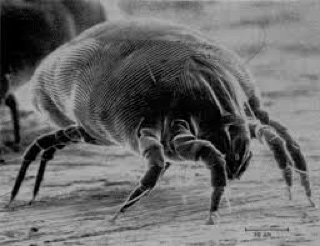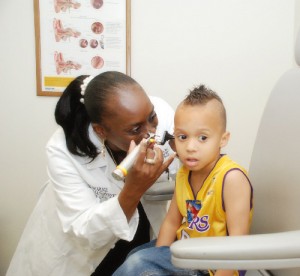- New Sublingual Allergy Tablets - October 31, 2014
- Ground-breaking New Treatment Option for Sleep Apnea - September 27, 2014
- Allergies versus Viruses in Children - September 27, 2014
- “Dog Dust” Protects Children from Allergies - September 27, 2014
- Nasal Saline Irrigation - August 8, 2014
- Doctor, I am Allergic to Dust. What Can I do? - July 31, 2014
- Infants Exposed to Dust Mites Less Likely to Develop Allergies - June 23, 2014
- How to Treat a Young Child’s Cough - December 17, 2013
- Many Parents are Unaware That Their Children Are at Risk for Noise Induced Hearing Loss - December 9, 2013
- Is it a Cold or an Ear Infection? - December 9, 2013
 Can you believe exposing your baby to this creature may actually decrease their risk of developing allergies! Counterintuitive but possibly true. Infants purposefully exposed to dust mites were 1/3 as likely to develop allergies. These findings from a UK study were presented today at the European Academy of Allery and Clinical Immunology.
Can you believe exposing your baby to this creature may actually decrease their risk of developing allergies! Counterintuitive but possibly true. Infants purposefully exposed to dust mites were 1/3 as likely to develop allergies. These findings from a UK study were presented today at the European Academy of Allery and Clinical Immunology.
In this study of 111 children with allergic parents, half were treated with oral drops containing dust mite allergen and the other half with placebo. These children were given drops twice a day from 6 months to 18 months of age. In the placebo group 25.5% developed allergies but in the dust mite treated patients only 9.4% developed allergies. Researchers hope by reducing allergies early in life it could reduce childhood development of asthma, eczema and other allergic disease. They plan to follow up with the children in this study at 3 and 5 years of age.
So what are these creatures? They are dust mites and one of the main culprits responsible for allergies. Exposure to high levels of dust mites can contribute to the development of childhood asthma. Dust mites are microscopic arachnids (8 legged) which eat skin and pet dander. They are found in pillows, mattresses, sofas and carpeting. Once you are allergic to dust mites it is important to reduce your exposure to them to control symptoms. However, this repost and other recent studies have shown early exposure to dust mites may be protective but must occur before the baby’s 1st birthday.
To learn more about allergies or Dr. Belinda Mantle, please visit www.ohni.org.



